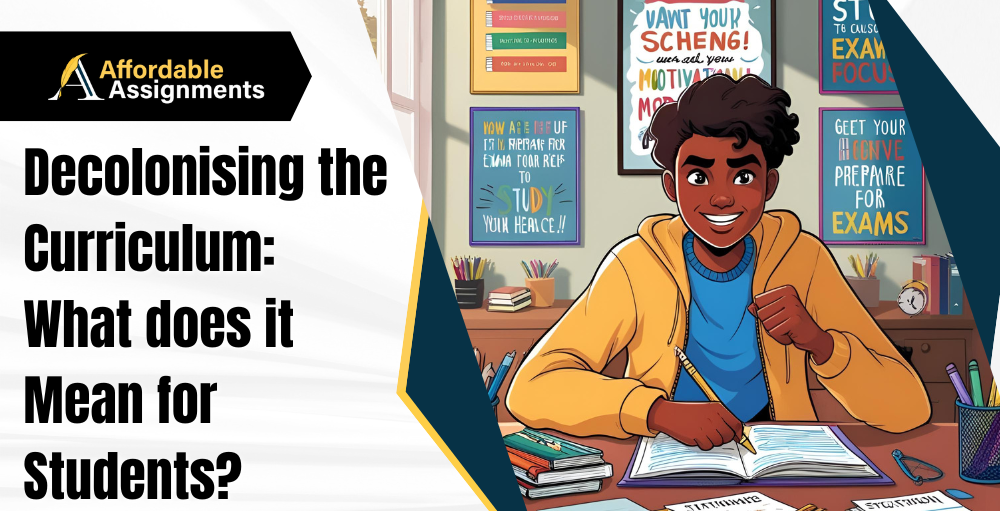To understand what decolonising the curriculum means, we need to first understand what colonialism in education means. Even after the independence from Eurocentric colonial powers, students are forced to study courses based on Eurocentric ideologies and narrow Western lenses.
Decolonisation of the curriculum is about identifying and challenging single-minded and biased knowledge. It doesn’t say that there is a need to delete all existing knowledge; instead, it encourages embracing the knowledge outside of the typical Western understanding.
Why Does Decolonisation Matter?
Decolonisation of the curriculum doesn’t restrict the Western perspective; instead, it expands the landscape of knowledge and gives voice to the perspective that has been overlooked for a long time. The following are the three main reasons for decolonising the curriculum:
- Representation: Many students from a minority don’t get to learn their side of the story. By decolonisation, they can also feel a sense of belonging and representation.
- Broader Perspective: Decolonisation allows students to think outside of the box and think critically about history with the help of multiple perspectives.
- Global Relevance: We all live in an interconnected world. Learning about each other’s perspectives provides a better understanding of cultures.
Many courses involve the philosophies, histories, and ideologies that are biasedly written by Westerners. With textbooks filled with such biased information, academic performance can decline rapidly. In such situations, online assignment writing services UK are very beneficial because of their unbiased and professionally researched content.
What Does Decolonisation Look Like?
Decolonisation is the perfect opportunity to add more to the single-minded knowledge provided to the students. Decolonisation varies depending on the nature of the course, such as:
- History: In history, students get to learn the explorative adventures of colonial powers. The inclusion of perspectives from colonised countries can reflect their cultural strength.
- Literature: Decolonisation in literature looks like a canvas with multiple splashes of colours, as it involves exploring artists from multiple cultures instead of reading only Shakespeare.
- Philosophy: Exploring the philosophical side of various cultures refers to learning traditional aspects of Africa, Islam and Indigenous South Asia, instead of reading only Greek and European thinkers.
- Science and Medicine: Acknowledging the contribution of non-Western scientists instead of crediting only the Western ones reduces the sense of racism.
All of these courses require a detailed and unbiased dissertation in the final year, for which thorough research and explanation of the content are vital. Similarly, dissertation writing services UK offer students a thoroughly researched and explained dissertation, without any biases.
What Challenges Does Decolonisation Come With?
Decolonisation in education is not as easy as it sounds. Students have faced multiple obstacles when they have led campaigns. The reason behind those challenges is the unawareness of the term. Decolonisation is the most misunderstood term when it comes to education. Some of the basic issues with decolonised education are:
- Lack of Institutional Support: Some institutes don’t fully understand the meaning and purpose of decolonisation and feel unequipped to change their course material, they have been using for years.
- Fear of Politicisation: Many critics frame the movement as “anti-West”, ignoring the truth of inclusive intent behind the political words.
- Lack of Resources: Many institutions resist bringing decolonisation because they lack access to alternative material and diverse scholarly resources.
The institutions might resist bringing decolonisation, but a unique perspective can provide you with a wider space to think openly, which also leaves a positive impression on the professors checking your papers. Through online exam help, you can gain access to an unbiased and authentic history.
What Steps Can Students Take?
The actions taken by the students are what make decolonisation possible in education. From mentioning its importance to leading campaigns for its application, all the movements are led by the students. Some of the other change-infusing actions that students can take are:
- Ask Critical Questions: Students can ask questions and by thinking critically, and in this subtle way, they can learn the other side of the story.
- Engage in Discussions: They can mention the need for multicultural perspectives during lectures and class discussions for better understanding.
- Support the Campus Campaign: Students can show their support by joining student societies and movements that are fighting to bring change to education.
- Collaborate with the Staff: Students who already know how to think outside the box can offer to identify resources and alternative texts.
- Educating Themselves: In the UK, students are encouraged to learn independently. The internet is filled with knowledge, which makes it easier for students to keep themselves updated.
How to Step Forward
Decolonising the curriculum is about more than the academics. It’s about fighting the deep-rooted racism that lurks behind every mind silently. Decolonisation means equity, justice, and the kind of society we want to build. Regardless of the background, it allows students to see clearly their heritage and potential for the future.
Institutions make it hard to understand that this is the opportunity for them to bring change and update their outdated course material, and create learning environments that are actively inclusive.
Not just for institutes, decolonisation gives students a chance as well to connect with peers and learn about each other’s cultures. This brings students together, and instead of searching for assignment help online, students who want unbiased research in their assignments can then ask each other, “Write my assignment for me.”
What are the Final Thoughts?
Decolonisation is another way to welcome students who are coming from different countries to the UK to study. Highlighting their part in history makes them feel seen and important. Even though it’s not a completely political concept, decolonisation in education calls out to the silent racism.
Irrelevant and outdated curriculum can restrict students’ critical thinking, creative thinking, and intellectuality. By decolonising the curriculum, students can build their worth and individuality that is unique and different from others.




Pingback: Benefits of Personal Mentorship from Top CUET Coaching in Delhi